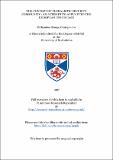The concept of pluralistic security community : an attempt to apply it to the European Union case
Abstract
This dissertation aims at developing and testing the concept of pluralistic security community evolved by Karl Deutsch in the 1950s. In essence, a pluralistic security community is a union in which war is no longer contemplated as a possible way of resolving conflicts among its members. The conditions for the emergence of a pluralistic security community are threefold; (a) compatibility of major values; (b) mutual responsiveness and (c) mutual predictability of behaviour. Compatibility of major values has often been studied in relation to the democratic peace theory but, more than democracy as such, it is the conditions underlying its emergence (individualism and the spirit of trade) that foster peace. Mutual responsiveness is closely linked to the theory of cybernetics and requires the existence of many links between the units of the security community allowing the peaceful resolution of conflicts. Mutual predictability of behaviour implies the existence of long-term trust between the members of the community. A parallel is possible with the rational expectation theory in economics. As a conclusion to this part, it can be asserted that the concept studied is the main contribution to an embryonic theory of international pluralism. After the analysis of the concept, an attempt is made to apply it in the case of the European Union. To test the reality of compatibility of major values, a content analysis of the final communiques of the European Council over the past few years is made. Mutual responsiveness is tested thanks to a study of European regional policy and redistribution, since the existence of redistribution is a sign of cohesion and trust. Finally, mutual predictability of behaviour is tested through the study of European security integration (especially the Franco-German partnership, weapons coproduction and through the study of Europe as an 'actor' in the world stage). This concept of pluralistic security community is a valuable tool for explaining some features of the global setting like the peaceful long-term coexistence of states at the international level. The concept is also very relevant in the European Union as it explains one important achievement of European integration; long-term peace in Europe.
Type
Thesis, MPhil Master of Philosophy
Collections
Items in the St Andrews Research Repository are protected by copyright, with all rights reserved, unless otherwise indicated.

